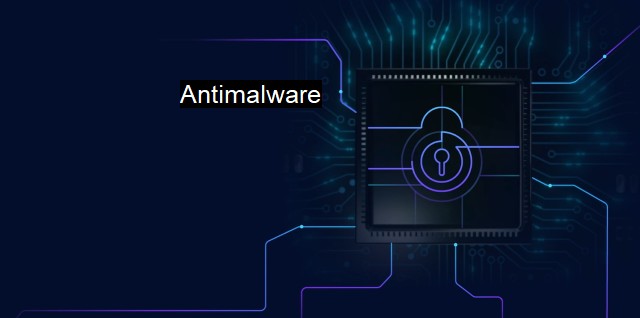What is Antimalware?
The Importance of Antimalware Software in Cybersecurity: Protecting Systems and Networks from Evolving Threats
AntiMalware, often written as 'anti-malware', is a type of software designed to protect computer systems and networks from malicious software, otherwise known as malware. It is instrumental in the realm of cybersecurity as malicious software poses a critical threat to digital infrastructure worldwide. A close cousin to antivirus software, anti-malware programs focus on broader ranges of malicious programs beyond just viruses.Malware comes in various types such as viruses, worms, ransomware, spyware, adware, Trojans, and more. These all pose serious threats, designed not just to cause chaos but often to gain unauthorized access or control over a system, steal sensitive information, or disrupt standard operations. The results can be catastrophic particularly in the context of sensitive information, financial details, or the workings of important systems such as those found in corporations, hospitals, or even government organizations. Malware can lead to serious data breaches, loss of vital info, and major disruptions so protective measures like anti-malware software are of paramount importance.
Anti-malware software operates by scanning, identifying, and removing malware from a computer system or network. It typically works by maintaining an extensive database of known malware definitions, which it uses to check against files. This allows it to detect the presence of any malicious software on the system and take actions to isolate or eliminate them. More advanced anti-malware software can even recognize potential threats not currently in its database using heuristic techniques allowing for detection based on a generic signatures shared between families of malware due to their common origin or purpose.
One important aspect of anti-malware software to note is real-time protection. This ensures that the anti-malware software is constantly on guard, scanning in real-time to catch and neutralize threats as they occur, rather than waiting until the user initiates a system scan. This in-built vigilance and automation contributes to enhancing the security profile of systems and networks.
One common misconception is that antivirus and anti-malware software are the same. While they share similarities, the fundamental difference lies in the scope of protection offered. Traditionally, antivirus programs were designed to detect and block computer viruses, while the anti-malware was designed to protect against the broader spectrum of malicious software. In modern times the line between the two softwares has blurred, with both providing comprehensive security solutions against various types of malware, though still differences exist with some focusing more heavily on certain types of threats.
Given the ever-evolving nature of cyber threats, it's not enough to have anti-malware software installed and running on your computer. It's crucial to keep the software updated, as developers regularly release updates that include new definitions of malware and hacking strategies. Without these updates, even the most robust anti-malware software can be rendered ineffective against the latest threats.
In the cybersecurity context of guarding against digital infringements and threats, anti-malware acts as a vital barrier safeguarding a computer system. The increasingly interconnected world, and the ongoing rise in our dependency on digital platforms, makes the importance of effective cybersecurity vital so the importance of having anti-malware in our defenses cannot be underscored enough. Anti-malware software forms the basis of this barricade, ensuring that our computers and systems are constantly monitored, threats detected and neutralized, and the smooth operation of our digital world continues unhindered.

Antimalware FAQs
What is antimalware?
Antimalware is a type of software designed to detect, prevent, and remove malicious software or malware from a computer system. It is a crucial component of cybersecurity, protecting computers and networks from various types of cyberattacks.What is the difference between antimalware and antivirus?
Antimalware and antivirus are often used interchangeably, but antimalware is a broader term that encompasses all types of malicious software, while antivirus specifically targets computer viruses. Antimalware software can detect and remove a wider range of threats, including viruses, worms, Trojans, spyware, adware, and other malicious software.How does antimalware work?
Antimalware uses a variety of techniques to identify and remove malware. This includes scanning files and data for known malware signatures, behavioral analysis to detect suspicious activity, sandboxing to isolate and analyze suspected malware, and real-time monitoring to detect and block threats as they occur. Some antimalware software also uses machine learning and artificial intelligence to improve detection rates and adapt to new threats.Do I need antimalware if I already have antivirus software?
While antivirus software is an essential component of cybersecurity, it may not be enough to fully protect your computer or network. Antimalware software provides an additional layer of protection, detecting and removing threats that may not be detected by antivirus. It is recommended to use both antivirus and antimalware software in conjunction for maximum protection against cyber threats.| | A | | | B | | | C | | | D | | | E | | | F | | | G | | | H | | | I | | | J | | | K | | | L | | | M | |
| | N | | | O | | | P | | | Q | | | R | | | S | | | T | | | U | | | V | | | W | | | X | | | Y | | | Z | |
| | 1 | | | 2 | | | 3 | | | 4 | | | 7 | | | 8 | | |||||||